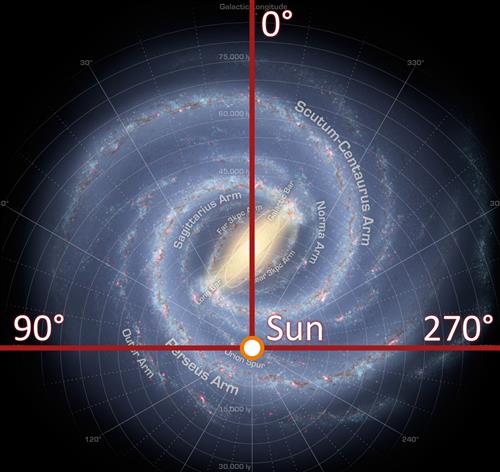 Close Topic Options
Close Topic OptionsOur Location In The Universe
Our Location Universe - Sciences, Education, Art, Writing, UFO - Posted: 30th Aug, 2016 - 7:57pm
Our Location In The Universe
Our Location In The Universe
Another reason why there hasn't been any Direct Meetings With Aliens may have to do with our location in the Milky Way Galaxy and even the wider universe. We are almost on the outskirts of a very huge galaxy with the center having many enormous stars and a black hole! We, in other words are like a small village far from the big city - there is no rush to visit us, no one might even know about us.
Image from NASA - where we are in the Milky Way.

Our Location In The Universe (Hover)
Universe The Location Our
I guess it will have to depend on how long these very advanced aliens have had their technology to visit other solar systems without taking much time to do it. Really, our step up from primitive man has only been about 10,000 years if that. If anyone passed through here before that they have thought the planet wasn't worth the visit.
Our Location In The Universe UFO & Writing Art Education Sciences
ATLASGAL Survey Of Milky Way Completed
Science Related News
A spectacular image of the Milky Way has been released to mark the completion of the APEX Telescope Large Area Survey of the Galaxy (ATLASGAL). The APEX telescope has mapped the full area of the Galactic Plane visible from the southern hemisphere for the first time at submillimeter wavelengths and in finer detail than space-based surveys. The APEX telescope allows the study of the cold universe, a few tens of degrees above absolute zero.
Source
Universe The Location Our
A source accelerating Galactic cosmic rays to unprecedented energy discovered at the center of the Milky Way
For more than ten years the H.E.S.S. Observatory in Namibia, run by an international collaboration of 42 institutions in 12 countries, has been mapping the center of our galaxy in very-high-energy gamma rays. These gamma rays are produced by cosmic rays from the innermost region of the Galaxy. A detailed analysis of the latest H.E.S.S. Data reveals for the first time a source of this cosmic radiation at energies never observed before in the Milky Way: the supermassive black hole at the center of the Galaxy, likely to accelerate cosmic rays to energies 100 times larger than those achieved at the largest terrestrial particle accelerator Ref. Source 6b.
Universe The Location Our
Cosmic beacons reveal the Milky Way's ancient core
Astronomers have discovered that the central 2000 light years within the Milky Way Galaxy hosts an ancient population of stars. These stars are more than 10 billion years old and their orbits in space preserve the early history of the formation of the Milky Way. For the first time the team kinematically disentangled this ancient component from the stellar population that currently dominates the mass of the central Galaxy. Ref. Source 2b.
Our Location In The Universe
Measuring the Milky Way: One massive problem, one new solution
It is a galactic challenge, to be sure, but Gwendolyn Eadie is getting closer to an accurate answer to a question that has defined her early career in astrophysics: what is the mass of the Milky Way? Ref. Source 1w.
Our Location The Universe
Astronomers discover dizzying spin of the Milky Way galaxy's 'halo'
Astronomers have discovered for the first time that the hot gas in the halo of the Milky Way galaxy is spinning in the same direction and at comparable speed as the galaxy's disk, which contains our stars, planets, gas, and dust. This new knowledge sheds light on how individual atoms have assembled into stars, planets, and galaxies like our own, and what the future holds for these galaxies. Ref. Source 2x.
Our Location The Universe Sciences Education Art Writing & UFO
Milky Way had a blowout bash 6 million years ago
The center of the Milky Way galaxy is currently a quiet place where a supermassive black hole slumbers, only occasionally slurping small sips of hydrogen gas. But it wasn't always this way. A new study shows that 6 million years ago, when the first human ancestors known as hominins walked the Earth, our galaxy's core blazed forth furiously. The evidence for this active phase came from a search for the galaxy's missing mass. Ref. Source 6w.
 TOPIC: Our Location In The Universe
TOPIC: Our Location In The Universe The Milky Way - Our Solar System
The Milky Way - Our Solar System